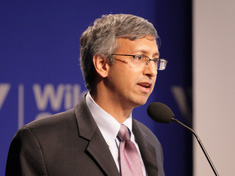-
“A Once in a Generation Moment”: Manish Bapna on the Sustainable Development Goals
April 3, 2015 By Theo Wilson
“The thing that is most gripping about the SDGs is their desire to be much more transformative in terms of what they mean for the planet,” says Manish Bapna, executive vice president and managing director of the World Resources Institute, in this week’s podcast.
“The thing that is most gripping about the SDGs is their desire to be much more transformative in terms of what they mean for the planet,” says Manish Bapna, executive vice president and managing director of the World Resources Institute, in this week’s podcast.
The Sustainable Development Goals (SDGs) are set to succeed the eight Millennium Development Goals (MDGs), an initiative commissioned by the United Nations in 2000 to tackle extreme poverty in the developing world.
Much has changed in the years since the MDG’s initial conception. “As we look at eradicating extreme poverty moving forward, we’re working in more difficult political and environmental contexts than may have been the case in the last 15 years,” says Bapna. The distinction between developed and developing countries is less relevant.
“We can’t really solve and eradicate extreme poverty if we have four degrees of warming”“The Millennium Development Goals were largely about how the rich world can pay for things to improve the condition in the developing world,” he says. “There has been a real seismic shift in moving towards an agenda that would speak to all countries…We want an agenda that is universal, that not only speaks to poverty or depravation in the developing world, but poverty and depravation in all countries.”
The sheer complexity of that challenge has led to a more multidisciplinary approach. An intergovernmental body, called the Open Working Group, has been working to draft new goals since 2012 and at last count had reached 17 goals and 169 targets.
The SDGs are more comprehensive in scope than the MDGs, particularly in regards to the environment. MDG 7 – “ensure environmental sustainability” – was “largely an afterthought,” says Bapna. “Now there is no shortage of goals that speak to different dimensions of sustainability, whether it is around natural resources, whether it is around climate change, whether it’s around food-energy- water.”
This was not an accident but a reflection of how important the environment is to development and wellbeing in many parts of the world. “There was a much greater effort in the design of the Sustainable Development Goals to identify targets or pieces of these goals that spoke to each other,” says Bapna. “Climate and development are inextricably linked…We can’t really solve and eradicate extreme poverty if we have four degrees of warming.”
A Critical Nine Months
The MDGs expire at the end of this year and the SDGs are expected to be introduced this September in New York. There’s also an important financing for development conference in Addis Ababa in July and one of the most highly anticipated climate summits in Paris this fall. “We’re now at a critical point,” says Bapna. “You have in this very short six-month span this once in a generation moment when all these three incredibly important summits are going to be taking place together.”
“It only works if people truly, truly embrace it”Political sensitivities will be high, and on the SDGs, there’s a risk that governments will “open up a ‘Pandora’s box’ and everything else will have to be completely renegotiated,” he says. “Do we take what we have with some small incremental change or do we do something more significant but take the risk of opening up the entire political process?”
“This is voluntary normative framework,” Bapna says, “it only works if people truly, truly embrace it and integrate it into what they do.” The agenda must be meaningful for the poorest countries; emerging middle income countries, like China, India, and Brazil; and the United States and the rest of the developed world.
“You all know the business school literature – 60 to 90 percent of corporations fail not because they have the wrong strategy, they just didn’t execute well,” Bapna says. Countries like Sweden, Colombia, Costa Rica, Switzerland, and Rwanda have demonstrated how to integrate the MDGs into their national planning. “We need to see more of that and we need to support that, because at the end of the day it’s the actual practice that will mobilize and inspire others.”
Manish Bapna spoke at the Wilson Center on March 18 as part the “Managing Our Planet” seminar series.
Friday Podcasts are also available for download on iTunes.
Topics: climate change, cooperation, development, energy, environment, food security, Friday Podcasts, MDGs, podcast, poverty, SDGs, U.S., UN, water
 A Publication of the Stimson Center.
A Publication of the Stimson Center.







